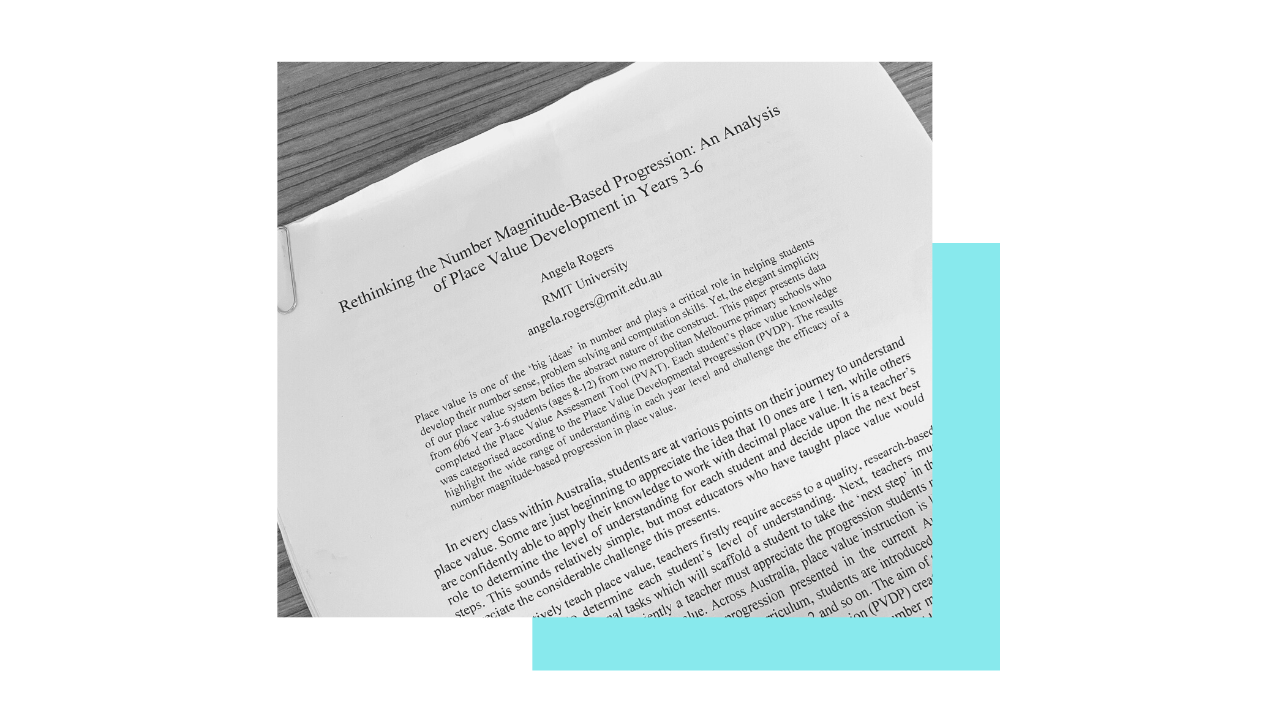My takeaways from the MERGA 2023 conference
Jul 27, 2023
On the school holidays I had the pleasure of spending four days in beautiful Newcastle in New South Wales. I was attending the Mathematics Education Research Group of Australasia (MERGA) conference presenting a research paper titled “Rethinking the Number Magnitude-based Progression: An Analysis of Place Value Development in Years 3-6”.
If you are interested, you can find my paper here. But if it is TLDR (too long didn’t read) for you, the summary is that student progression in place value is not as simple as teaching 2 digit numbers, then 3 digit numbers and so on. It is more nuanced. There are 6 aspects within place value (which you can read more about in my blog here). Each aspect has its own ‘cadence’ (I may have been influenced by the Tour de France 🤷♀️) that teachers need to be aware of when introducing place value. It also talks about the importance of using quality data to guide our instruction. The PVAT data I share shows many students in Year 4 are still struggling to master whole number place value. I make the point that introducing these students to decimal place value (as suggested in the Year 4 curriculum/syllabus documents) is making their (and your) life more difficult. When students have the prior knowledge of whole number place value to connect their decimal place value understandings to, learning these concepts is so much easier!
It is always great to attend these conferences as you are given the opportunity to listen to the research that people across the Australasia and beyond are conducting. Importantly you also have time to talk through current issues and things that are happening in the world of maths education, meet new people with similar interests and learn from knowledgeable, passionate and experienced people in the maths education community.
This year I was interested in several sessions that I attended. I wanted to mention them briefly here and encourage you to look at the papers the sessions were based around. The beauty of MERGA papers is they are only 7 pages (and often the last one is references). So it is a concise summary of a snippet of research. As you know I am very passionate about linking research and practice in mathematics education. So I wanted to share fours papers that I think would really benefit classroom teachers.
The first was was the embodiment of mathematics by Dr Katherin Cartwright from Sydney Uni. Katherin presented an excellent research paper looking at using gesture, drawing and movement in K-2 maths classrooms (page 139 of the MERGA conference proceedings- co authored by Associate Professor Jenni Way). This session really got me thinking about the importance and value of using these 'tools' in the classroom.
I am a big advocate of using gesture in my lessons. It really helps students make a non verbal connection to the idea I am teaching. It allows their brain to connect a word and an action. I use gesture when taking to students about renaming numbers. I gesture to shows tens 'coming out' of the hundreds. This helps students to have a visual of an otherwise abstract idea and also allows them to communicate their ideas when they may not yet have the words to explain.
Dr James Russo and Associate Professor Sarah Hopkins presented two separate papers looking at Mental Computation. James looked at gender differences and it was fascinating to see that girls were much more likely to resort to a counting on based strategy to unknown facts than boys. He identified that the "10 most difficult single-digit addition combinations for students to accurately recall are (in descending order): 6 + 9; 7 + 8; 7 + 9; 6 + 8; 5 + 9; 5 + 8; 6 + 7; 5 + 7; 8 + 9; 4 + 9". And talked about ‘bridge to ten’ being the most important single digit strategy to teach students. I highly recommend having a look at James' paper which begins on page 443 of the proceedings.
Sarah's paper, co authored with Dr Karina Wilkie and Anne Roache, talks about the difference between version 8.4 and 9.0 of the curriculum in terms of addition and subtraction fact recall. They explain that in Version 8.4 of the curriculum 'recall' of facts wasn't mentioned until Year 3:
Recall addition facts for single-digit numbers and related subtraction facts to develop increasingly efficient mental strategies for computation (ACMNA055)
However, in Version 9.0 of the curriculum, Year 2 students are required to recall and demonstrate proficiency with addition facts to 20.
The paper mentions (among other things) that this is a big jump in the number of facts students are required to recall: "The change in curriculum wording translates to a substantial increase in the number of problems explicitly referred to in the standard, from 64 problems to 304 problems" This paper can be found on page 267 of the proceedings.
Finally, PhD student Jane Hubbard presented an excellent session looking at assessing social competencies while working with challenging tasks in F-2. One of the challenges (pardon the pun) with challenging tasks can be assessing student progress. Jane's sessions (and paper) explores this idea and shows how there are many elements related to student disposition that are also important for us to observe and assess. Jane's paper begins on page 275 of the proceedings.
This week it is my hope that my blog inspires you to engage with some of the research presented above (or other papers of interest in the proceedings).
Sometimes it is hard to know where to start in the research world. It can seem overwhelming and paywalls get in the way of us accessing many articles. The beauty of the MERGA proceedings is that they are freely available for anyone to access on the MERGA website. So I encourage you to have a read through one of these articles, and if you find it interesting, perhaps photocopy and share it with a colleague. When we know better, we do better!
Have a great week!
-Ange

